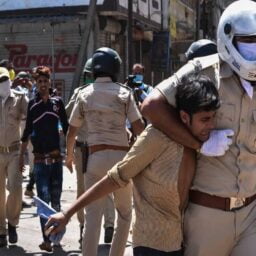INTRODUCTION
The principle of ‘non-refoulement’ denotes that it is forbidden to send back a refugee during in need of security and until the guarantee is proven he cannot be returned to that state where he has fear of persecution.[1] Though it appeared first in 1892, the principle developed during World War II and embedded in the Convention Relating to the Status of Refugees 1951 and the 1967 Protocol. The safeguard against refoulement under Article 33(1) spreads on to any individual who is a displaced person under the provisions of the Convention of 1951 if any individual meets the prerequisites of the outcast explanation contained under Article 1A (2) the Convention.[2] Additionally, the OAU Convention of 1969 and the ACHR of 1969 mentions ‘non-refoulement’ obligations.[3] The ‘non-refoulement’ principle is of specific significance to asylum-seekers. It is a recognized principle of ‘international refugee law’ that they should not be returned to.[4] Due to pandemic, many people where forced to leave their home states. This paper will discuss non-refoulement during COVID and whether states are exempted from the obligations or not.
PRACTICAL APPLICATION
The principle of ‘non-refoulement’ is considered a vital component of the insurance against torment or different types of cruel, barbaric, or debasing treatment or discipline, or discretionary deprivation of life by the UN Human Rights Committee and by the ECtHR.[5] Additionally, the Principle of ‘‘non-refoulement’ is had equivalent status as jus cogens. The Cartagena Declaration of 1984 emphasis the principle as a keystone to protect the refugee internationally and should be observed as a rule of jus cogens.[6] It is the responsibility of the states to allow the entry of refugees or asylum-seekers who are in need. Even if that is not possible, a safe relocation must be done. Otherwise, exceptions mentioned in Article 33(2) the Convention of 1951, no expulsion of the refugee is permitted. However, in practical scenarios, some states have violated the principle. For example, vessels of EU States patrol the territorial waters of a third country based on an agreement with that third country. The migrants are prevented to reach the high seas or territorial waters of EU Member States Since the vessels stop their boats, force them to turn back to the third-country shore.[7] In 2021, Malaysia sent back Myanmar nationals even though Malaysian Court have granted interim staying order.[8] The immigration chief stated it was done with the consent of Myanmar nationals. Nevertheless, Amnesty International stated that it was a pure violation of the principle of ‘non-refoulement’.[9]
CASE LAWS
In a recent case filed in Russia, the parties overstayed in Russia and did not have a valid passport.[10] They were apprehended.[11] The parties feared that they would be sent to North Korea since Russia and North Korea have a bilateral agreement named, “Agreement on the transfer and reception of persons who have illegally entered or are illegally residing within the territories of Russia and North Korea”.[12] The Court took consideration of the matter that human rights are violated in North Korea and decided the admissibility and just satisfaction of the case.[13] It is understood that a state cannot send the parties to another state where human rights are violated even doing the exception of the non-refoulment.[14] In Hirsi Jamaa case Italy rejected the entry of African emigrants as well as asylum-seekers on the high seas.[15] Twenty-four people escaped from Somalia and Eritrea interrupted at sea by Italian authorities in 2009 and compelled to return to Libya where they were departed.[16] The practice desecrated international responsibilities to not return persons to countries where they could be in danger of human rights abuses.[17] The Grand Chamber held that since the government in Libya was Colonel Mu’ammar al-Gaddafi’s, Italy breached the provisions of ECHR by returning the migrants to the country.[18]
DURING COVID-19
Whether the public health emergency enables a government to overlook the principle of ‘‘non-refoulement’’ or not. Article 33(2) as aforesaid, mentions that a refugee does not have entitlement to the benefits of the Refugee Convention if “there are reasonable grounds for regarding as a danger to the security of the country”.[19] At first glance, that means it will be the discretion of the government. However, COVID-19 is not an excuse for the states to escape from ‘non-refoulement’ responsibilities. In M.S.S. v. Belgium and Greece, an asylum seeker initially from Afghanistan contested Belgium’s verdict was returned the appellant to Greece where he first arrived.[20] The Court held that Belgium had dishonoured Article 3 of the Convention by sending the applicant to Greece where the applicant was subject to derogatory living conditions.[21] Hence, the excuse of a pandemic does not exempt the obligations of ‘non-refoulement’. Additionally, in a wider approach, “degrading confinement and living conditions” may comprise conditions in countries where a pandemic is unrestrained. Moreover, in Tineo Family v. Bolivia, the Inter-American Court of Human Rights voiced practical precautions that States Parties to ACHR must meet before they can eject or deport an asylum-seeker.[22] The State must permit an asylum-seeker an “adequate and individualized” analysis of their application, must evaluate that individual’s “personal circumstances,” and in the case of a hostile conclusion must have the right to “review before a competent authority.”[23] Therefore, States which are party to the ACHR are obliged to adhere to the principle during a pandemic.[24] According to Paposhvili v. Belgium, if a refugee has a serious illness and if he was allowed to go back to his country of origin, he would have faced inhuman derogatory treatment, the host state cannot return that person. Hence, obligation of ‘non-refoulement’.[25]
CONCLUSION
From the aforesaid discussion, it is seen that the protection of ‘non-refoulement’ covers all the individuals who have left their homeland for considerable fear of persecution for reasons specified by the Convention of 1951 and who has reasonable ground that he/she would be subjected to torture or inhuman or other degrading treatment or punishment if forced to return to his/her country. This legal principle has customary nature and according to some scholars, it is to be the rule of jus cogens. Moreover, due to the evolution of international law, ‘non-refoulement’ principle has application outside of the territory of a state such as airport transit zones, international zones.[26] In Cyprus v. Turkey, the Court held that the high contracting states must protect the rights and freedom of the individuals in its territory and beyond.[27] At present, the principle of ‘‘non-refoulement’’ has become more than the cornerstone of asylum since it has been reinforced with general human rights. COVID-19 does not give an excuse to ignore the principle and states have obligations to the people who come to seek help during their time of need.
Author(s) Name: Zahirul Bashar (Trainee Lawyer,
MCLaw Services, Dhaka, Bangladesh)
References:
[1] Tamas Molnar, ‘The Principle of Non-Refoulement Under International Law: Its Inception and Evolution in a Nutshell’ [2016] 1(1) COJOURN 51-61.
[2] UN High Commissioner for Refugees (UNHCR), Advisory Opinion on the Extraterritorial Application of Non-Refoulement Obligations under the 1951 Convention relating to the Status of Refugees and its 1967 Protocol, 26 January 2007, available at:< https://www.refworld.org/docid/45f17a1a4.html>
[3] OAU Convention Governing Specific Aspects of Refugee Problems in Africa, 1969, art. 3 & American Convention on Human Right 1969, art 22(8).
[4] Ibid.
[5] “Note on Migration and the Principle of Non-Refoulement: ICRC, 2018” (2017) 99 International Review of the Red Cross 345.
[6] n (1).
[7] Fundamental Rights Agency, Scope of the principle of non-refoulement in contemporary border management: evolving areas of law. (Luxembourg, 2016) p.28. Available at: <https://fra.europa.eu/en/publication/2016/scope-principle-non-refoulement-contemporary-border-management-evolving-areas-law>
[8] Al Jazeera and News Agencies, ‘Malaysia deports 1,086 Myanmar nationals despite Court order’ (Al Jazeera, 23 February 2021) <https://www.aljazeera.com/news/2021/2/23/malaysia-deports-1200-people-to-myanmar>
[9] Ibid.
[10] Case of M.L. And Others v. Russia, App. No(s). 25079/19 & 18570/19 (ECHR, 6th April, 2021) available at: <http://hudoc.echr.coe.int/eng?i=001-209195>
[11] Ibid.
[12] Ibid.
[13] Ibid.
[14] Ibid.
[15]Hirsi Jamaa and Others v. Italy, App No. 27765/09 (ECHR, 23rd February, 2012) available at: <http://hudoc.echr.coe.int/fre?i=001-109231>
[16] Ibid.
[17] Ibid.
[18] Ibid.
[19] Oona Hathaway, Mark Stevens and Preston Lim, ‘ COVID-19 and International Law: Refugee Law – The Principle of Non-Refoulement’ (Just Security, 30 November 2020) <https://www.justsecurity.org/73593/covid-19-and-international-law-refugee-law-the-principle-of-non-refoulement/>
[20] M.S.S. v. Belgium and Greece, Application no. 30696/09, Council of Europe: European Court of Human Rights, 21 January 2011, available at: <https://www.refworld.org/cases,ECHR,4d39bc7f2.html>
[21] Ibid.
[22] UN High Commissioner for Refugees (UNHCR), Case of Pacheco Tineo Family v. Bolivia (Summary of the Judgment), 25 November 2013, available at: <https://www.refworld.org/docid/53ce2cee4.html>
[23] n (18).
[24] Ibid.
[25] Paposhvili v. Belgium, Application no. 41738/10, Council of Europe: European Court of Human Rights, 13 December 2016, available at: <https://www.refworld.org/cases,ECHR,5859459b4.html>
[26] Amuur v. France, 17/1995/523/609, Council of Europe: European Court of Human Rights, 25 June 1996, available at: <https://www.refworld.org/cases,ECHR,3ae6b76710.html> See also, Hirsi Jamaa and Others v. Italy, App No. 27765/09 (ECHR, 23rd February, 2012) available at: <http://hudoc.echr.coe.int/fre?i=001-109231>
[27] Cyprus v. Turkey, 25781/94, Council of Europe: European Court of Human Rights, 10 May 2001, available at: <https://www.refworld.org/cases,ECHR,43de0e7a4.html>















